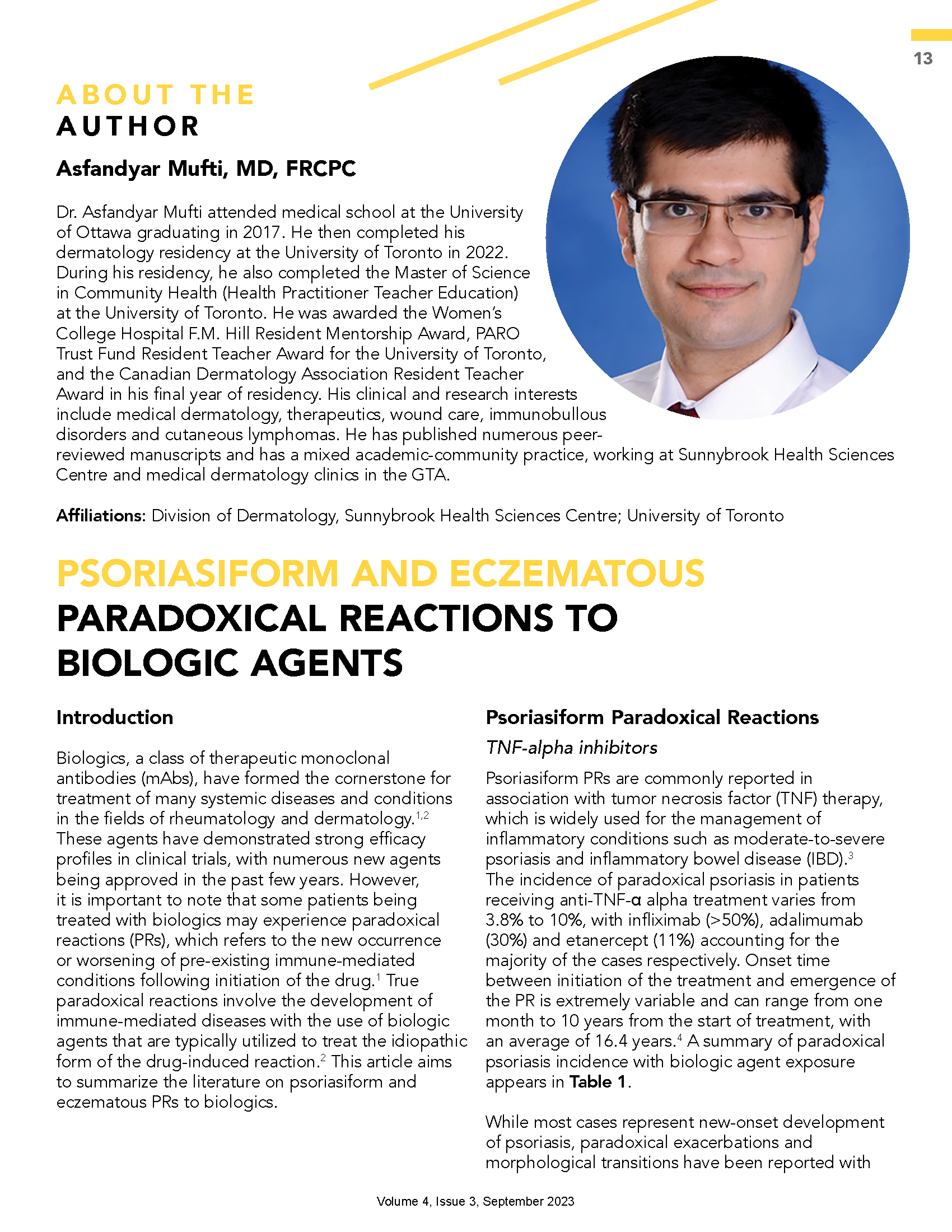Psoriasiform and Eczematous Paradoxical Reactions to Biologic Agents
Abstract
Biologics, a class of therapeutic monoclonal antibodies (mABs), have formed the cornerstone for treatment of many systemic diseases and conditions in the fields of rheumatology and dermatology. These agents have demonstrated strong efficacy profiles in clinical trials, with numerous new agents being approved in the past few years. However, it is important to note that some patients being treated with biologics may experience paradoxical reactions (PRs), which refers to the new occurrence or worsening of pre-existing immune-mediated conditions following initiation of the drug. True paradoxical reactions involve the development of immune-mediated diseases with the use of biologic agents that are typically utilized to treat the idiopathic form of the drug-induced reaction. This article aims to summarize the literature on psoriasiform and eczematous PRs to biologics.
References
Murphy MJ, Cohen JM, Vesely MD, et al. Paradoxical eruptions to targeted therapies in dermatology: A systematic review and analysis. J Am Acad Dermatol. 2022;86(5):1080-1091.
Munera-Campos M, Ballesca F, Carrascosa JM. Paradoxical reactions to biologic therapy in psoriasis: a review of the literature. Actas Dermo-Sifiliográficas (English Edition). 2018;109(9):791-800.
Jiraskova Zakostelska Z, Reiss Z, Tlaskalova-Hogenova H et al. Paradoxical reactions to anti-TNFα and anti-IL-17 treatment in psoriasis patients: are skin and/or gut microbia involved? Dermatol Ther (Heidelb). 2023;13(4):911-933.
Camela E, Potestio L, Fabbrocini G, et al. Paradoxical reactions to biologicals for psoriasis. Expert Opin Biol Ther. 2022;22(12):1435-1437.
Miyagawa F. Pathogenesis of paradoxical reactions associated with targeted biologic agents for inflammatory skin diseases. Biomedicines. 2022;10(7):1485.
Collamer AN, Battafarano DF. Psoriatic skin lesions induced by tumor necrosis factor antagonist therapy: clinical features and possible immunopathogenesis. Semin Arthritis Rheum. 2010;40(3):233-240.
Succaria F, Bhawan J. Cutaneous side effects of biologics in immune-mediated disorders: a histopathological perspective. J Dermatol. 2017;44(3):243-250.
Eickstaedt J, Paller AS, Lund E, et al. Paradoxical psoriasiform eruptions in children receiving tumor necrosis factor α inhibitors. JAMA Dermatology. 2023;159(6):637-642.
Karamanakos A, Vergou T, Panopoulos S, et al. Psoriasis as an adverse reaction to biologic agents beyond anti-TNF-α therapy. Eur J Derm. 2021;31(3):307-317.
Su Z, Zeng YP. Dupilumab-associated psoriasis and psoriasiform manifestations: a scoping review [published online ahead of print, 2023 Apr 26]. Dermatology. 2023;1.
Al-Janabi A, Foulkes AC, Mason K, et al. Phenotypic switch to eczema in patients receiving biologics for plaque psoriasis: a systematic review. J Eur Acad Dermatol Venereol. 2020;34(7):1440-1448.
Li Y, Liu H, Zhang F. Biologics-induced immunophenotypic cross-switching in patients with psoriasis and atopic dermatitis. Indian J Dermatol. 2023; 68:186-91.
Alsenaid A, Piguet V, Lansang P, et al. Brodalumab-induced eczematous reactions in psoriasis patients: management with switching to risankizumab. J Cutan Med Surg. 2023;27(3):236-240.
Reyn B, Gils A, Hillary T. Eczematous eruption after guselkumab treatment for psoriasis. JAAD Case Reports. 2019;5(11):973-975.
Truong A, Le S, Kiuru M, Maverakis E. Nummular dermatitis on guselkumab for palmoplantar psoriasis. Dermatol Ther. 2019 Jul;32(4):e12954.
Kromer C, Schön MP, Mössner R. Eczematous eruption in patients with psoriasis during risankizumab treatment. Eur J Dermatol. 2021;30(5):599-601.
Li SJ, Perez-Chada LM, Merola JF. TNF inhibitor-induced psoriasis: proposed algorithm for treatment and management. J Psoriasis Psoriatic Arthritis. 2019;4(2):70-80.
Laurindo IM, Scheinberg M. Why do some biologic agents induce psoriasis or psoriasiform lesions? Nat Rev Rheumatol. 2008;4(4):168-169.
Revankar R, Patel H, Rojas M, et al. Systematic review of TNFα-induced paradoxical psoriasis: Treatment outcomes of switching to alternative biologic therapies in inflammatory bowel disease patients. J Dermatol Treat. 2023;34(1):2133533.
Croitoru DO, Brooks SG, Nathanielsz N, et al. Predictors of severity in paradoxical psoriasis from biologic therapies: A systematic review. J Am Acad Dermatol. 2023;88(2):471-473.


